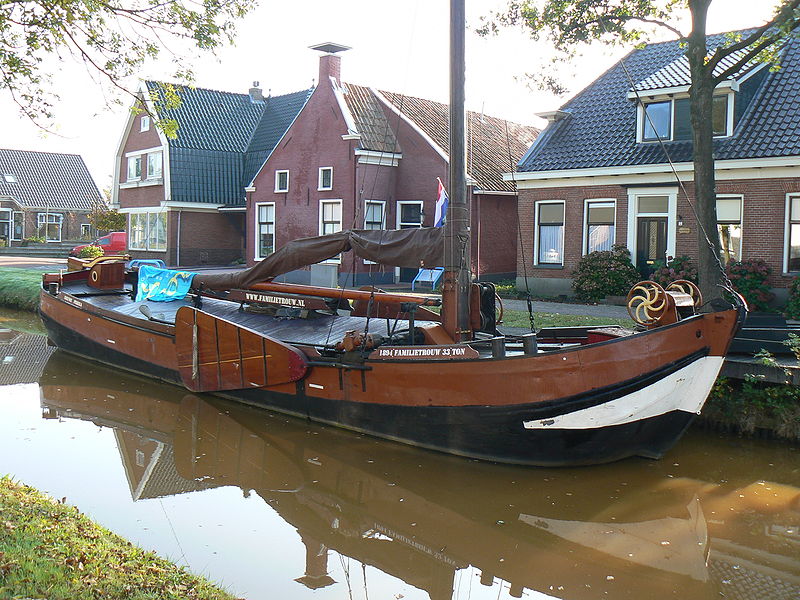It's also beautiful. One of the few places in the Netherlands where you would walk or bicycle for hours on end without meeting another person. There's the scarcely inhabited no-man's land on the border where it's hard to say where the Netherlands end and Germany begins. And the spaciousness: there are very few trees, and the land is flat as can be, so there is this enormous and sometimes menacing sky hovering above you, sometimes making you feel small, sometimes comforting, in spring when everything is in bloom.

Then there's the villages. With houses that actually look like houses. Not like the deadeningly functional, characterless suburban monsters they build today, but houses with windows and door straight at the street that smile or gin or scowl at you. The way they used to build before the 1930s or so.

In both the towns and the landscape, there's a strictness, a radicalness if you will: the canal towns easily extend for ten, fifteen kilometres or so along the water with little of a town centre or anything. The fields themselves, black in the wintertime, are pierced by equally straight canals with water that can be grey or black in winter but a warm, dark green when the sun shines upon it.
Religiously, it's the typical countryside Dutch patchwork: my own home town sported a big Roman-Catholic Community, an equally big Dutch protestant community, and smaller Dutch-reformed, Christian-reformed and even Lutheran groups. Everywhere in the countryside, there used to be a sizable Jewish community as well until the Nazis destroyed all that. Politically, aside from places where the small Protestant parties hold sway, it's red territory: power used to be divided between Dutch labour and the Dutch communist party, and after the demise of the Dutch CP and its successor organizations the hard-left Socialist Party is making inroads. I recall that during the eighties, during election time, about half of our street would sport CP posters.
It's a wonderful place. And slowly, bit by bit, it's being fucked up beyond repair.
It's been downhill ever since deindustrialization took off in the 1960s or so, and the factories that had been so important in my home town - bricks, potato starch, but especially paper and cardboard - began to decline. Unemployment was extremely high when I grew up, and there wasn't anything (and still isn't) to keep young people in the area. No jobs. Very little in the way of entertainment: when I went out, I bicycled seventeen kilometres to Stadskanaal. There used to be a post office in the town when I was little but that's gone as well. And public transportation, connections and all that aren't getting any better either.
Can't blame them for leaving. I didn't stick around myself.
There's resentment in Groningen province towards the political elites of the West of the Netherlands. And some of it probably very justified. But the worst enemy, I think, is the layer of local politicians and bureaucrats and developers and the dreadful ideas they come up with. In the Netherlands in general, there's a harebrained idea that decent agricultural land, which our forefathers wrestled from the sea with great effort, should be "given back to nature" - as if there is such a thing as "nature" in the Netherlands. A local variety of it has been the almost-completed submerging of some of the most beautiful countryside in the area in order to build expensive (and, needless to say, pug-ugly) waterfront property - the "Blauwe Stad" project. Personally, I hope no-one will come to live there and it will turn out to be a massive financial disaster.
Though it's too late the undo the destruction that has already been wrought, of course.
Today I read that local politicians in one community have decided that the village of Ganzedijk - one of the smaller villages which has suffered especially from population drain - is to be wholly demolished. Needless to say the people remaining in the village are incensed and determined to resist (and most of them are home-owners). But it's one more symptom of the problem the countryside is dealing with. There's nothing there: the buses are replaced by taxi-buses are replaced by nothing at all; the post-office, the library, and then the schools are leaving; and finally the people themselves are packing up.
And the response by local decision-makers is to demolish or submerge the place.
It's such a waste. Not only of the beautiful, agricultural landscape, or of the unique architecture. Also of the enormous efforts that have gone in to making the country habitable in the first place. But I have little right to complain, seeing as I left like so many of my generation.
I used to think of returning sometimes. But the longer, the less I feel like it. I don't want to see the faceless suburban watery paradises that project developers are raising over what used to be farmhouses and fields. I don't want to see what they're doing to the place. It's not my home country anymore.

2 opmerkingen:
I don't read Dutch. Nevertheless, it seems to me that Nederlands is doomed
Who knows where to download XRumer 5.0 Palladium?
Help, please. All recommend this program to effectively advertise on the Internet, this is the best program!
Een reactie posten